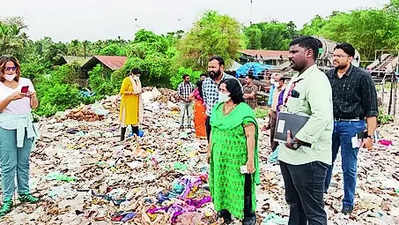- News
- City News
- thiruvananthapuram News
- Green protocols of waste mgmt facilities evaluated
Trending
This story is from January 30, 2024
Green protocols of waste mgmt facilities evaluated

Thiruvananthapuram: World Bank’s environmental team visited several urban local bodies (ULBs) last week to evaluate the environmental safeguards of waste management facilities under the Kerala Solid Waste Management Project (KSWMP), being implemented with World Bank (WB) and Asia Infrastructure Investment Bank (AIIB) aid.
The team, which visited urban areas that fall under four clusters from Jan 23 to 25, took stock of the green protocols being followed by the ongoing works, held discussions with elected representatives and officials of local bodies and made suggestions to ensure efficiency of the projects, wherever they needed improvement.
The team comprised World Bank’s South Asia regional safeguards coordinator Josefo Tuyor, senior environmental specialist Deepa Balakrishnan, senior specialist Natasa Vetma and regional safeguards coordinator, India, Neha Vyas.
Various waste management and processing facilities visited by the team included those in Attingal (T’puram), Ambalamedu, Kalamassery, Thrikkakkara, Elur and Thumburmuzhi (Ernakulam), Chalakudy, Thrissur corporation, Paravattani and Kovilakathupadam (Thrissur), Valanchery (Malappuram), Kozhikode corporation, and Vatakara (Kozhikode). The team also visited the cotton bag wending centre at Mattannur in Kannur district.
The quantification and characterization survey under the WB-aided KSWMP of the local self government department is progressing in full swing in ULBs across the state.
The survey aims to assess the quantity and characteristics of the solid waste generated within the limits of each municipality and corporation in the state, to be leveraged as critical inputs in deciding the specific features and capacity of the waste management infrastructure required by each place. The survey has been completed in 42 ULBs and is on in the remaining 51 ULBs.
The team, which visited urban areas that fall under four clusters from Jan 23 to 25, took stock of the green protocols being followed by the ongoing works, held discussions with elected representatives and officials of local bodies and made suggestions to ensure efficiency of the projects, wherever they needed improvement.
The team comprised World Bank’s South Asia regional safeguards coordinator Josefo Tuyor, senior environmental specialist Deepa Balakrishnan, senior specialist Natasa Vetma and regional safeguards coordinator, India, Neha Vyas.
Various waste management and processing facilities visited by the team included those in Attingal (T’puram), Ambalamedu, Kalamassery, Thrikkakkara, Elur and Thumburmuzhi (Ernakulam), Chalakudy, Thrissur corporation, Paravattani and Kovilakathupadam (Thrissur), Valanchery (Malappuram), Kozhikode corporation, and Vatakara (Kozhikode). The team also visited the cotton bag wending centre at Mattannur in Kannur district.
The delegation held extensive interactions with KSWMP project director Divya S Iyer, KSWMP deputy project director, S Subodh and other officials of the KSWMP state project management unit, focussing on the improvements needed for making the environmental safeguards of the waste management and processing facilities totally safe by ensuring that they will not cause any harm to the ecosystem in and around their locations.
The quantification and characterization survey under the WB-aided KSWMP of the local self government department is progressing in full swing in ULBs across the state.
The survey aims to assess the quantity and characteristics of the solid waste generated within the limits of each municipality and corporation in the state, to be leveraged as critical inputs in deciding the specific features and capacity of the waste management infrastructure required by each place. The survey has been completed in 42 ULBs and is on in the remaining 51 ULBs.
We also published the following articles recently
MNNIT to suggest ways to manage waste disposal
Prayagraj Mela Authority collaborates with MNNIT to address the challenge of garbage disposal during Maha Kumbh. Experts will develop a sensor-based pipeline system to prevent waste from polluting the Ganga. Technologies like automated drone monitoring and sensor-equipped dustbins will also be implemented for efficient waste management.
Prayagraj Mela Authority collaborates with MNNIT to address the challenge of garbage disposal during Maha Kumbh. Experts will develop a sensor-based pipeline system to prevent waste from polluting the Ganga. Technologies like automated drone monitoring and sensor-equipped dustbins will also be implemented for efficient waste management.
LMC inks pact with Chennai firm to manage Lucknows waste
The Lucknow Municipal Corporation (LMC) signed a contract with a Chennai-based private company to improve door-to-door garbage collection, waste management, and drainage cleaning services. The new company will address issues such as open dumping and will initiate operations by the end of February. LMC will retain responsibility for waste management in some zones for now.
The Lucknow Municipal Corporation (LMC) signed a contract with a Chennai-based private company to improve door-to-door garbage collection, waste management, and drainage cleaning services. The new company will address issues such as open dumping and will initiate operations by the end of February. LMC will retain responsibility for waste management in some zones for now.
Recognised for Covid management, SGPGI director credits team for feat
Director of Sanjay Gandhi Postgraduate Institute of Medical Sciences, Professor Radhakrishna Dhiman, attributes his success to his dedicated team and family support. He received the Padma Shri award for his work in Hepatitis C, Covid-19 management, and organ donation. Originally from Saharanpur, his academic journey includes degrees from Lucknow KGMU and SGPGIMS.
Director of Sanjay Gandhi Postgraduate Institute of Medical Sciences, Professor Radhakrishna Dhiman, attributes his success to his dedicated team and family support. He received the Padma Shri award for his work in Hepatitis C, Covid-19 management, and organ donation. Originally from Saharanpur, his academic journey includes degrees from Lucknow KGMU and SGPGIMS.
End of Article
FOLLOW US ON SOCIAL MEDIA










